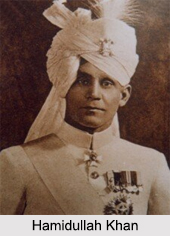 During British rule in India (which covers both the British East India Company rule and later the British Raj), the state of Bhopal was ruled by many people. They were Muslims and had served the state under the title of "Nawab". Given below are the rulers of Bhopal.
During British rule in India (which covers both the British East India Company rule and later the British Raj), the state of Bhopal was ruled by many people. They were Muslims and had served the state under the title of "Nawab". Given below are the rulers of Bhopal.
Faiz Mohammad Khan
Faiz Mohammad Khan was the third Nawab of Bhopal. He was the son of Y Muhammad, the second Nawab of Bhopal and the stepson of Mamola Bai, a very influential Hindu wife of Y Muhammad. Faiz Mohammad ruled from 1742 to 1777. In the event of the advancing Sultan Mohammad Khan and Sadar Khan and their sponsored revolt in Islamnagar, Mamola Bai made the 11-year-old Faiz Muhammad Khan the new Nawab of Bhopal. The stepmother and her son declared Bijjeh Ram as the commander of the Mughal Army consisting of 5000 troops. This army forwarded to Eidgah Hill to battle against Sultan Mohammad Khan. Sultan Mohammad Khan`s forces abandoned him and recognized Faiz Muhammad Khan as the new Nawab.
Hayat Mohammad Khan
Hayat Mohammad Khan ruled Bhopal as a Nawab from 1777 to1807.
Ghous Mohammad Khan
Ghous Mohammad Khan was the Nawab of Bhopal from 1807 to 1826.
Wazir Muhammed Khan
Wazir Muhammed Khan was the Nawab of Bhopal in opposition to Nawab Ghous Muhammed Khan from 1807 to 1816. He has also served as the Diwan of Bhopal and the Commander-in-Chief of the Bhopal Army.
Nazar Muhammed Khan
Nazar Muhammed Khan, the son of Wazir Mohammad Khan was the Nawab of Bhopal from 1816 to 1819.
Munir Muhammed Khan
Munir Muhammed Khan was the Nawab of Bhopal from 1819 to 1827.
Muiz Muhammad Khan Bahadur
Muiz Muhammad Khan Bahadur was the Nawab of Bhopal from 1826 to 1837.
Jahangir Muhammad Khan Bahadur
Jahangir Muhammad Khan Bahadur served Bhopal as a Nawab from 1837 to 1844.
Faudjar Muhammed Khan
Faudjar Muhammed Khan served Bhopal as a Nawab from 1844 to 1847.
Hamidullah Khan
Hamidullah Khan was the last ruling Nawab of Bhopal. His reign continued from 20th of April, 1926 to 1st of June, 1949. Khan had served as a delegate to the Round Table Conference in London and as a Chancellor of the Chamber of Princes from 1944 to 1947. He was at the Battle of Keren and the Battle of El Alamein, during the Second World War. Post Indian Independence on August 15, 1947. Hamidullah Khan acceded Bhopal to India in 1949 making Bhopal one of the last states to sign the `Instrument of Accession`.






































